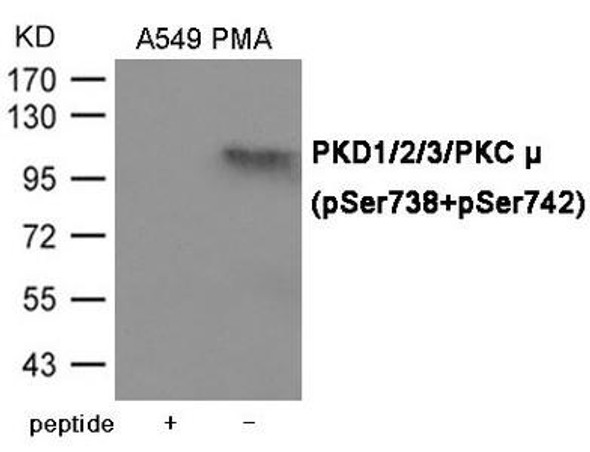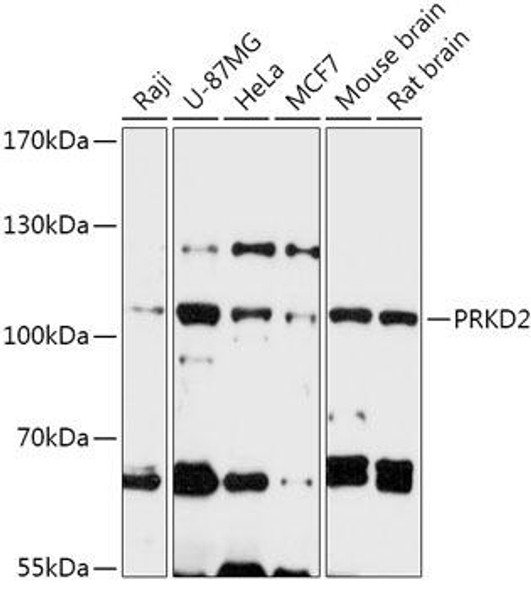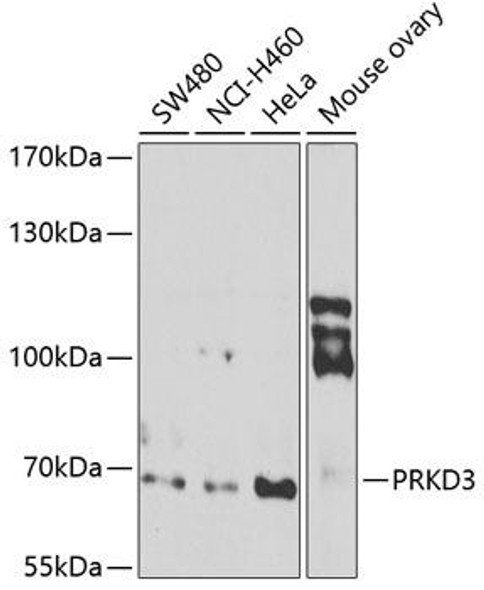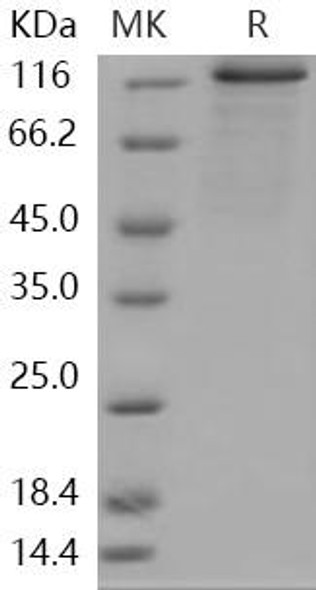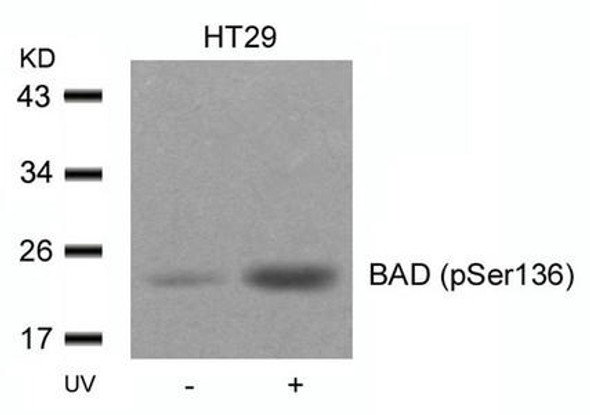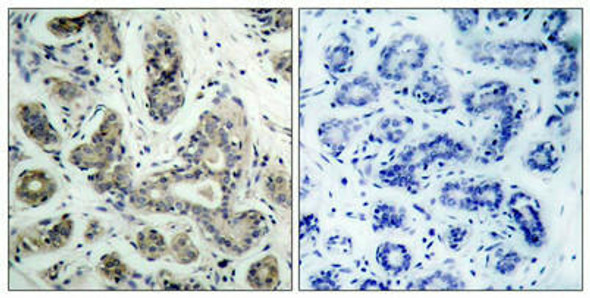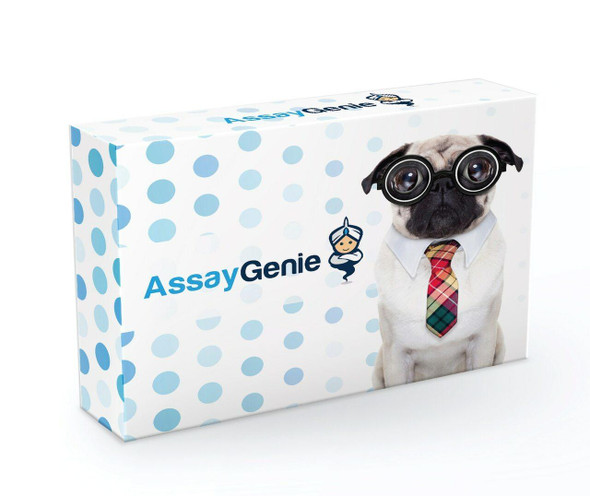Phospho-PRKD1/PRKD2/PRKD3 (S738/S742) Antibody (PACO03012)
- SKU:
- PACO03012
- Product Type:
- Antibody
- Reactivity:
- Human
- Mouse
- Rat
- Host Species:
- Rabbit
- Isotype:
- IgG
- Applications:
- ELISA
- WB
- IHC
- Antibody Type:
- Polyclonal Antibody
- Conjugation:
- Unconjugated
Description
Phospho-PRKD1/PRKD2/PRKD3 (S738/S742) Antibody (PACO03012)
The Phospho-PRKD1/PRKD2/PRKD3 (S738/S742) Antibody (PACO03012) is a valuable tool for researchers studying PRKD1, PRKD2, and PRKD3 proteins phosphorylation at Ser738/Ser742 residues. This polyclonal antibody is raised in rabbits and is highly specific for detecting phosphorylated PRKD1, PRKD2, and PRKD3 in human samples. Validated for use in Western blot applications, the antibody binds specifically to the phosphorylated Ser738/Ser742 sites on PRKD1, PRKD2, and PRKD3 proteins, allowing for precise detection and analysis in various cell types.PRKD1, PRKD2, and PRKD3 are protein kinases that play important roles in various cellular processes, including cell growth, differentiation, and survival.
Phosphorylation of these proteins at the Ser738/Ser742 sites is known to regulate their activity and function, making this antibody a valuable tool for studying the signaling pathways involving PRKD1, PRKD2, and PRKD3. Research into the phosphorylation status of these proteins is important for understanding their roles in cancer, cardiovascular diseases, and other pathologies where PRKD1, PRKD2, and PRKD3 are implicated. Overall, the Phospho-PRKD1/PRKD2/PRKD3 (S738/S742) Antibody (PACO03012
| Antibody Name: | Phospho-PRKD1/PRKD2/PRKD3 (S738/S742) Antibody |
| Antibody SKU: | PACO03012 |
| Size: | 50ug |
| Host Species: | Rabbit |
| Tested Applications: | ELISA, WB, IHC |
| Recommended Dilutions: | WB:1:500-1:2000, IHC:1:100-1:300 |
| Species Reactivity: | Human, Mouse, Rat |
| Immunogen: | synthesized peptide derived from human PKD1/2/3 around the phosphorylation site of S738/S742. |
| Form: | Liquid |
| Storage Buffer: | Liquid in PBS containing 50% glycerol, 0.5% BSA and 0.02% sodium azide. |
| Purification Method: | The antibody was affinity-purified from rabbit antiserum by affinity-chromatography using epitope-specific immunogen. |
| Clonality: | Polyclonal |
| Isotype: | IgG |
| Conjugate: | Non-conjugated |
| Synonyms: | PRKD1; PKD; PKD1; PRKCM; Serine/threonine-protein kinase D1; Protein kinase C mu type; Protein kinase D; nPKC-D1; nPKC-mu; PRKD2; PKD2; HSPC187; Serine/threonine-protein kinase D2; nPKC-D2; PRKD3; EPK2; PRKCN; Serine/threonine-protein kinas |
| UniProt Protein Function: | PRKD1: a CAMK kinase of the PKD family. Cleavage by caspase-3 following DNA damage activates it and alters its subcellular localization. Sensitizes cells to apoptosis induced by genotoxic stress. Its cleavage is blocked in cells that over-express the anti-apoptotic Bcl-x(L) protein. Expression of a caspase-resistant mutant partially inhibits DNA damage-induced apoptosis. Its activation by TLR ligands is dependent on MyD88, IRAK4 and -1, but not TRAF6. Essential for MyD88-dependent proinflammatory immune responses. Activated by diacylglycerol and phorbol esters. Binds to the trans-Golgi network and regulates the fission of transport carriers specifically destined to the cell surface. Colocalizes with F-actin at peripheral F-actin-rich structures in membrane ruffles at the edge of lamellipodia in cervical carcinoma cells. Substrates reportedly include critical regulatory proteins including CREB, SSH1L, CTNNB1, HDACs 5 and 7, PKD1, HPK1, MARK2, PIP5K2A, PPP1R14A |
| UniProt Protein Details: | Protein type:EC 2.7.11.13; Protein kinase, CAMK; Motility/polarity/chemotaxis; Autophagy; Protein kinase, Ser/Thr (non-receptor); Kinase, protein; CAMK group; PKD family Chromosomal Location of Human Ortholog: 14q11 Cellular Component: cytoplasm; cytosol; Golgi apparatus; integral to plasma membrane; plasma membrane; trans-Golgi network Molecular Function:identical protein binding; kinase activity; protein binding; protein kinase C activity; protein serine/threonine kinase activity Biological Process: activation of CREB transcription factor; activation of NF-kappaB transcription factor; cell proliferation; Golgi organization and biogenesis; Golgi vesicle transport; integrin-mediated signaling pathway; negative regulation of endocytosis; peptidyl-serine phosphorylation; positive regulation of angiogenesis; positive regulation of blood vessel endothelial cell migration; positive regulation of endothelial cell proliferation; positive regulation of I-kappaB kinase/NF-kappaB cascade; positive regulation of osteoblast differentiation; positive regulation of peptidyl-serine phosphorylation; positive regulation of transcription from RNA polymerase II promoter; protein amino acid autophosphorylation; protein amino acid phosphorylation; Ras protein signal transduction; regulation of protein stability; signal transduction; sphingolipid biosynthetic process; vascular endothelial growth factor receptor signaling pathway |
| NCBI Summary: | PRKD1 is a serine/threonine kinase that regulates a variety of cellular functions, including membrane receptor signaling, transport at the Golgi, protection from oxidative stress at the mitochondria, gene transcription, and regulation of cell shape, motility, and adhesion (summary by Eiseler et al., 2009 [PubMed 19329994]).[supplied by OMIM, Nov 2010] |
| UniProt Code: | Q15139 |
| NCBI GenInfo Identifier: | 209572639 |
| NCBI Gene ID: | 5587 |
| NCBI Accession: | Q15139.2 |
| UniProt Secondary Accession: | Q15139,A6NL64, B2RAF6, |
| UniProt Related Accession: | Q15139 |
| Molecular Weight: | 101,704 Da |
| NCBI Full Name: | Serine/threonine-protein kinase D1 |
| NCBI Synonym Full Names: | protein kinase D1 |
| NCBI Official Symbol: | PRKD1 |
| NCBI Official Synonym Symbols: | PKD; PKCM; PRKCM; PKC-MU |
| NCBI Protein Information: | serine/threonine-protein kinase D1 |
| UniProt Protein Name: | Serine/threonine-protein kinase D1 |
| UniProt Synonym Protein Names: | Protein kinase C mu type; Protein kinase D; nPKC-D1; nPKC-mu |
| Protein Family: | Serine/threonine-protein kinase |
| UniProt Gene Name: | PRKD1 |
| UniProt Entry Name: | KPCD1_HUMAN |



